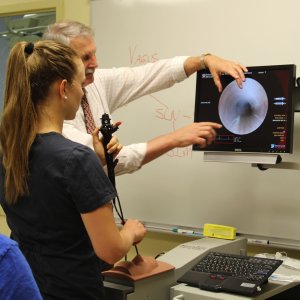Nurse Anesthesia Frequently Asked Questions
Admission
How many applications are received each year?
We typically receive approximately 125 applications yearly, although that number more than doubled in 2023.
How many students are accepted each year?
August 2016: 25
August 2017: 16
August 2018: 23
August 2019: 25
August 2020: 23
August 2021: 23
August 2022: 27
August 2023: 28
August 2024: 28
When is the application deadline?
Due to strong demand and limited class size, early application is encouraged. The Office of Admissions must receive the completed application with all supporting documents (evaluation forms, transcripts, licenses, proof of certifications, current Curriculum Vitae, etc.) before August 1st of the year of desired admission (August matriculation). Incomplete applications will not be considered after the August 1st deadline.
Should I observe the role of a CRNA (Certified Registered Nurse Anesthesiologist) before I apply?
-
Yes. We highly encourage all applicants to become familiar with the role of the CRNA. Try contacting a CRNA at your institution to shadow a CRNA and observe the operating room environment. Also, current nurse anesthesia graduate students offer a wealth of information from the student's perspective.
-
The Duke University School of Nursing offers yearly on-campus experience (contact the Office of Admissions for times). The on-campus experience provides an opportunity to meet the nurse anesthesia faculty and students face to face and ask questions regarding their circumstances.
I began working in the ICU two months ago. Am I eligible for an interview?
You must have a least one year of recent, continuous critical care experience before applying.
Who should I contact regarding the application process?
Please get in touch with the Office of Admissions for any inquiries regarding your application. SONAdmissions@mc.duke.edu or 877.415.3853.
Do you prefer specific areas of critical care experience?
At the time of application, the applicant must have a minimum of one year’s (two years preferred) current, continuous full-time acute care experience as a registered nurse in a critical care setting which offers the applicant an opportunity to develop as an independent decision-maker capable of using and interpreting advanced monitoring techniques based on their knowledge of physiological and pharmacological principles. Adult acute care experience offering interpretation and use of advanced monitoring, care of ventilated patients, pharmacologic hemodynamic management, and independent decision-making is preferred. CCRN certification is strongly encouraged.
Experience areas preferred include:
-
Surgical Intensive Care
-
Medical Intensive Care
-
Cardiac Intensive Care
-
Neuro Intensive Care
-
Pediatric or Level lll Neonatal Intensive Care
-
Trauma Intensive Care
I have a bachelor’s degree in a field other than Nursing. Can I obtain a nursing degree from a technical school and then apply to your anesthesia program?
Applicants must possess a Bachelor of Science in Nursing.
Do you require an NC license to apply for the program?
-
North Carolina nursing licensure is not required for the application process.
-
Applicants must submit, at the time of application, a copy of their valid, unencumbered RN license from the state where they practice.
-
All applicants must possess a valid, unencumbered RN license from at least one of the 50 United States.
-
Applicants accepted into the nurse anesthesia program must possess a valid, compact license as an RN, which must be maintained throughout the program.
Do you require CCRN certification for application or admission?
We do not require CCRN certification for admission. However, we strongly encourage certification due to the competitive nature of our admission process.
Will I complete all clinical training at Duke University Health System?
No. We currently utilize numerous clinical sites located throughout the state of North Carolina and Virginia. Students rotate through the various sites gaining valuable experiences unique to each facility.
Will I be required to travel to clinical sites and remain overnight?
Yes. A student housing option is provided for the student if the driving time to the clinical site is greater than one hour from the Duke University School of Nursing.
Does Duke University School of Nursing's Nurse Anesthesia-DNP program curriculum meet the educational requirements for professional licensure as a certified registered nurse anesthetist in all U.S. states, territories, and the District of Columbia?
Yes.
What is the minimum required grade to remain in the nurse anesthesia program?
The minimum course grade to remain in the Nurse Anesthesia Program is 83%. Students who have a final course grade <83% for any of the following courses will be administratively withdrawn from the program (N925, N926, N927, N928, N929, N932, N933, N942, N931, N936, N935, N943, N934, N944, N945, N946, N947, N948, N949, N930). Course grades are not rounded up.
What is the program’s overall National Certification Examination pass rate?
National Certification Examination pass rate 99%.
Financial Assistance
Can I apply for financial assistance?
Yes. Visit Financial Aid or call 877-344-4680 for comprehensive information on all timely financial aid that may be available.
Will I be able to work part-time during the program?
-
Successful completion of the Doctor of Nursing Practice Nurse Anesthesia Program (83-course credits) requires a substantial time commitment averaging 54-64 hours per week (including class time, clinical, and study time) during the 36-month program. The curriculum is designed for 36 months of full-time study. Historically, given the rigorous nature of the program, students find it challenging to subsidize their educational expenses through part-time employment. While we discourage part-time employment, students may choose to do so only if they maintain satisfactory academic progress. Said employment may not conflict with academic or clinical assignments. Scheduling of nurse anesthesia program activities will take precedence over scheduling needs for employment. Students are expected to responsibly manage their time and resources.
-
Students are strictly prohibited from working in any capacity that involves the administration of anesthesia.
Student Health Insurance
Students should visit the Student Health website for timely information about health insurance options while enrolled at Duke University.
 Admission
Admission